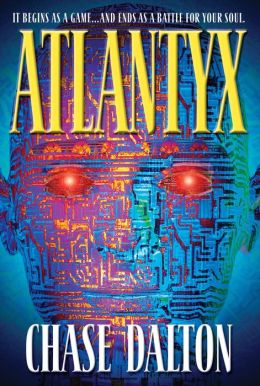 Atlantyx, by Chase Dalton. Paperback.
Atlantyx, by Chase Dalton. Paperback.Gamers are disappearing around the world, including college student Teddy Reams. His professors have been studying the mega-popular game Atlantyx, which was Teddy's main vice -- as it was for the seventy other gamers who have disappeared around the world lately. Valerie Russell and Garland King set out to discover what exactly is happening, and they find themselves in over their heads.
Atlantyx players must take a drug to fully immerse in the
virtual world, and most lose track of what is real and what is fantasy. When
Valerie enters the game under the influence, things go from bad to worse for
her. This is a multi-billion dollar game, and Atlantyx 2 is on the verge of
release -- what will the gaming company do to keep Valerie and Garland from
discovering the truth behind the disappearances?
The action in the story is well-paced, and the novel is a nice
quick read. Dalton does a good job describing the action inside the virtual
world, and the hallucinations that effect the gamers in the real world. We only
get the briefest glimpses into what makes the characters the people they are,
and perhaps slowing the action to give more character development would been preferable
to my taste.
The connection between drug addiction and video games seemed
far-fetched when the book was published in 2002, but the place of energy drinks
caffeine pills among youth culture today makes the book seem forward-thinking. As the years have gone by, the specifics of
the technology are less important, and a book like this becomes more enjoyable.
It has become retro in the eleven years since it was first published, and
without the distraction of deciding if the virtual world described is
"cutting edge" or "realistic," the reader can focus on the
story itself.As a university professor, I commend the attempt to turn my colleagues into action heroes, a trend started by Indiana Jones, and one of which I heartily approve. There are also enough references to intra-departmental squabbles and academic competition that I wonder if Dalton spent some time in front of a classroom as an adjunct instructor at some point in his career.
The Christian message of the story is fairly subtle throughout most of the book, manifesting in basic good vs. evil stuff, and a few references to Garland's work teaching Sunday School and leading prayer group. The last few pages of the story put a more specific spiritual message out front, and it does frankly feel a bit tacked on.
source: Friends of the Library book sale.
No comments:
Post a Comment